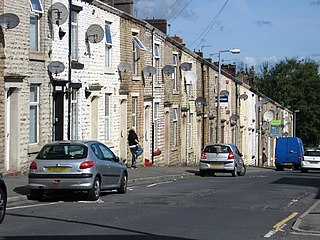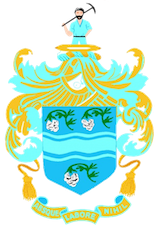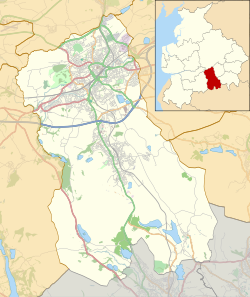
Blackburn is a large industrial town located in Lancashire, England, north of the West Pennine Moors on the southern edge of the Ribble Valley, 8 miles (13 km) east of Preston and 20.9 miles (34 km) NNW of Manchester. Blackburn is bounded to the south by Darwen, with which it forms the unitary authority of Blackburn with Darwen; Blackburn is its administrative centre.

Blackburn with Darwen is a unitary authority area in Lancashire, North West England. It consists of the town of Blackburn and the market town of Darwen including other villages around the two towns.

Darwen is a market town and civil parish located in Lancashire, England. Along with the larger town of Blackburn, it forms the Borough of Blackburn with Darwen — a unitary authority area. Its residents are known as "Darreners". The main road through Darwen is the A666 towards Blackburn to the north and Bolton to the south, and ultimately at the Pendlebury boundary with Irlams o' th' Height where it joins the A6, about 18 miles (29 km) north-west of Manchester. Darwen's population decreased to 28,046 in 2011 and is made up of five wards.
Baron Darwen, of Heys-in-Bowland in the West Riding of the County of York, is a title in the Peerage of the United Kingdom. It was created on 12 February 1946 for John Davies, a prominent cotton manufacturer. He served as a Lord-in-waiting from 1949 to 1950 in the Labour administration of Clement Attlee. As of 2011 the title is held by his great-grandson, the fourth Baron, who succeeded his father in 2011.

Grappenhall is a semi-rural village in Cheshire, England, along the Bridgewater Canal in the Grappenhall and Thelwall civil parish, which had a population of 9,377 at the 2001 census.

Ewood Park is a football stadium in the English town of Blackburn, Lancashire, and is the home of Blackburn Rovers Football Club — one of the founding members of the Football League and Premier League. Rovers have played there since they moved from Leamington Road in the summer of 1890. The stadium opened in 1882 and is an all seater multi-sports facility with a capacity of 31,367. It comprises four sections: The Bryan Douglas Darwen End, Riverside Stand, Ronnie Clayton Blackburn End, and Jack Walker Stand, which is named after Blackburn industrialist and club supporter, Jack Walker. The football pitch within the stadium measures 115 by 76 yards.

East Lancashire Coachbuilders Limited was a manufacturer of bus bodies and carriages founded in 1934 in Blackburn, Lancashire, England.
The 1892–93 season was the 22nd season of competitive football in England.
The Lancashire Telegraph, formerly the Lancashire Evening Telegraph, is a local tabloid newspaper distributed in East Lancashire, England. It is edited by Karl Holbrook. There are around twenty towns in the area, including Blackburn, Burnley, Accrington, Darwen, Nelson, Clitheroe, Colne, and Rawtenstall.
The 1896–97 season was Blackpool F.C.'s debut season in the Football League. They competed in the sixteen-team Division Two, then the second tier of English football, finishing eighth.
The Football League 1891–92 was the fourth season of English league football, and the last season of the football league running in a single division. Sunderland were the winners of the league which was their first ever league success. At the beginning of the season Stoke had left the Football Alliance and rejoined the Football League. Darwen also joined from the Alliance but they conceded 112 goals and finished bottom.
The 1892–93 season was the fifth season of The Football League. This season saw the introduction of the Second Division.

Darwen Library is a Carnegie library in Darwen, Lancashire, England. It opened in 1908 and is located on Knott Street.
Spring Vale railway station was a railway station that served the community of Spring Vale, in Darwen, Lancashire, England. It was opened by the Bolton, Blackburn, Clitheroe and West Yorkshire Railway on 3 August 1847, and was originally named Sough. At first, it was the southern terminus of the line from Blackburn ; the line south of Sough to Bolton opened on 12 June 1848 and was just located south of the road bridge at the top off Cranberry Lane The station was moved 150 yards north and was renamed Spring Vale and Sough in November 1870, and Spring Vale on 1 March 1877. It was closed on 5 August 1958, two days after nearby Lower Darwen. It achieved noteworthiness when, on the night of 25 September 1931, Mahatma Gandhi alighted from a train there to spend the night with a local family whilst visiting England to see the effects of his cotton making campaign on the British textile industry.
The 1891–92 season was Stoke's third season in the Football League.

Darwen Football Club was an association football club from Darwen in Lancashire, North West England. The team, formed in 1870, was an early pioneer of professional football in Northern England, reaching the semi-finals of the 1880–81 FA Cup. They were a Football League member from 1891 to 1899. Darwen joined the Lancashire League in 1900 and remained in regional football afterwards. They last played in the First Division of the North West Counties Football League in 2008–09, when the club was wound-up. A successor team, A.F.C. Darwen, was founded soon after. Darwen played their home games at the Anchor Ground.
Darwen Corporation Tramways operated a tramway service in Darwen between 1899 and 1946.
Darwen is a town in Lancashire, England. It contains 33 buildings that are recorded in the National Heritage List for England as designated listed buildings. Of these, three are listed at Grade II*, the middle grade, and the others are at Grade II, the lowest grade. Until the coming of the Industrial Revolution, Darwen was mainly agricultural, and the older listed buildings consist of farms, churches and a cottage. The later listed buildings vary considerably, and include more churches, and houses, memorials, bridges, a mill and its chimney, tram shelters, and the entrance to a railway tunnel.
The English Game is a British historical sports drama television miniseries developed by Julian Fellowes for Netflix about the origins of modern association football in England. The six-part series was released on 20 March 2020.
The 1891-92 season was Sunderland's 12th season in existence, and their second season as a Football League club.








